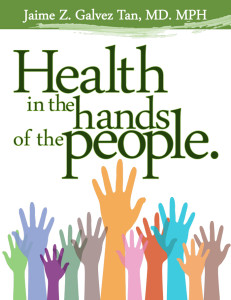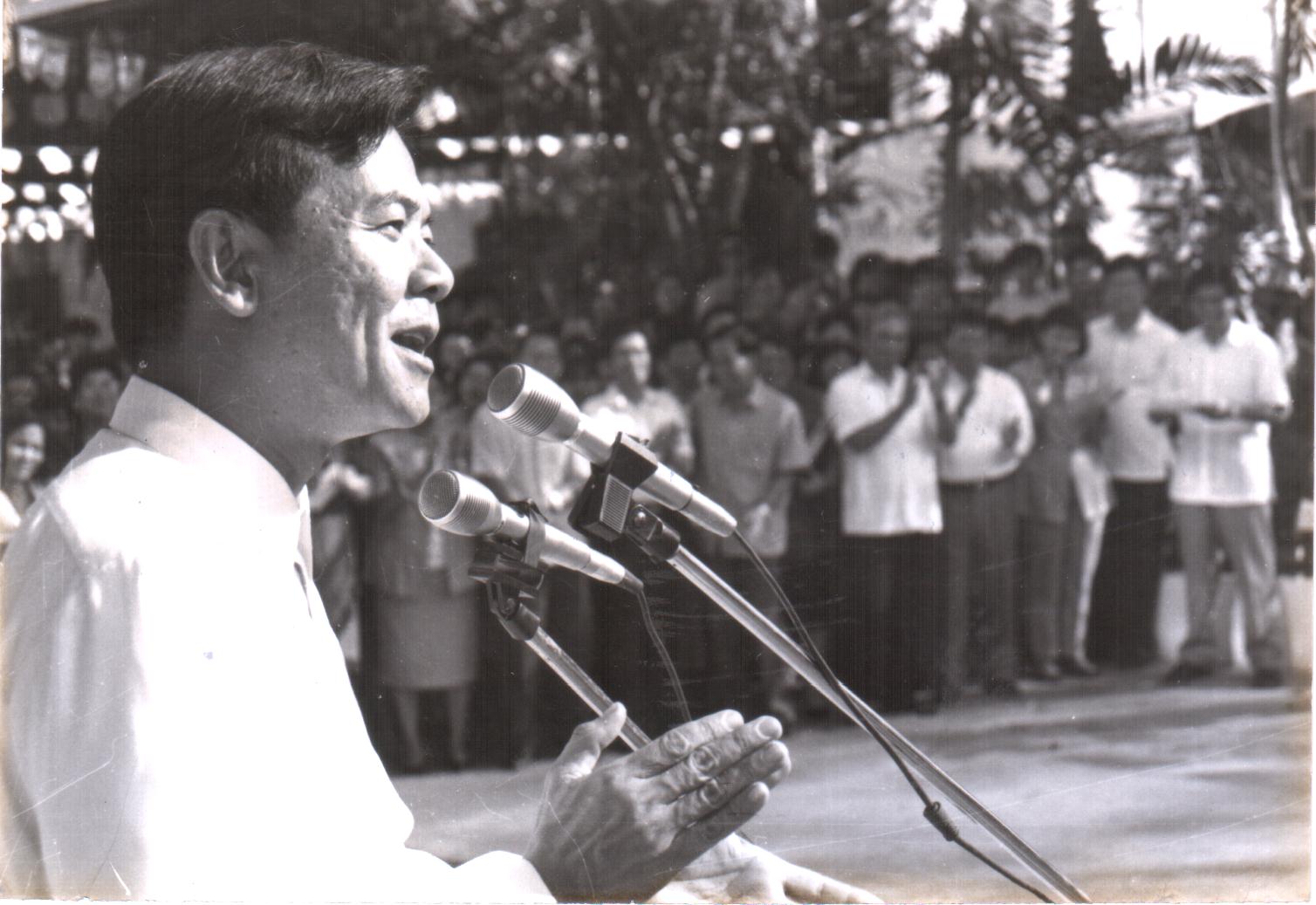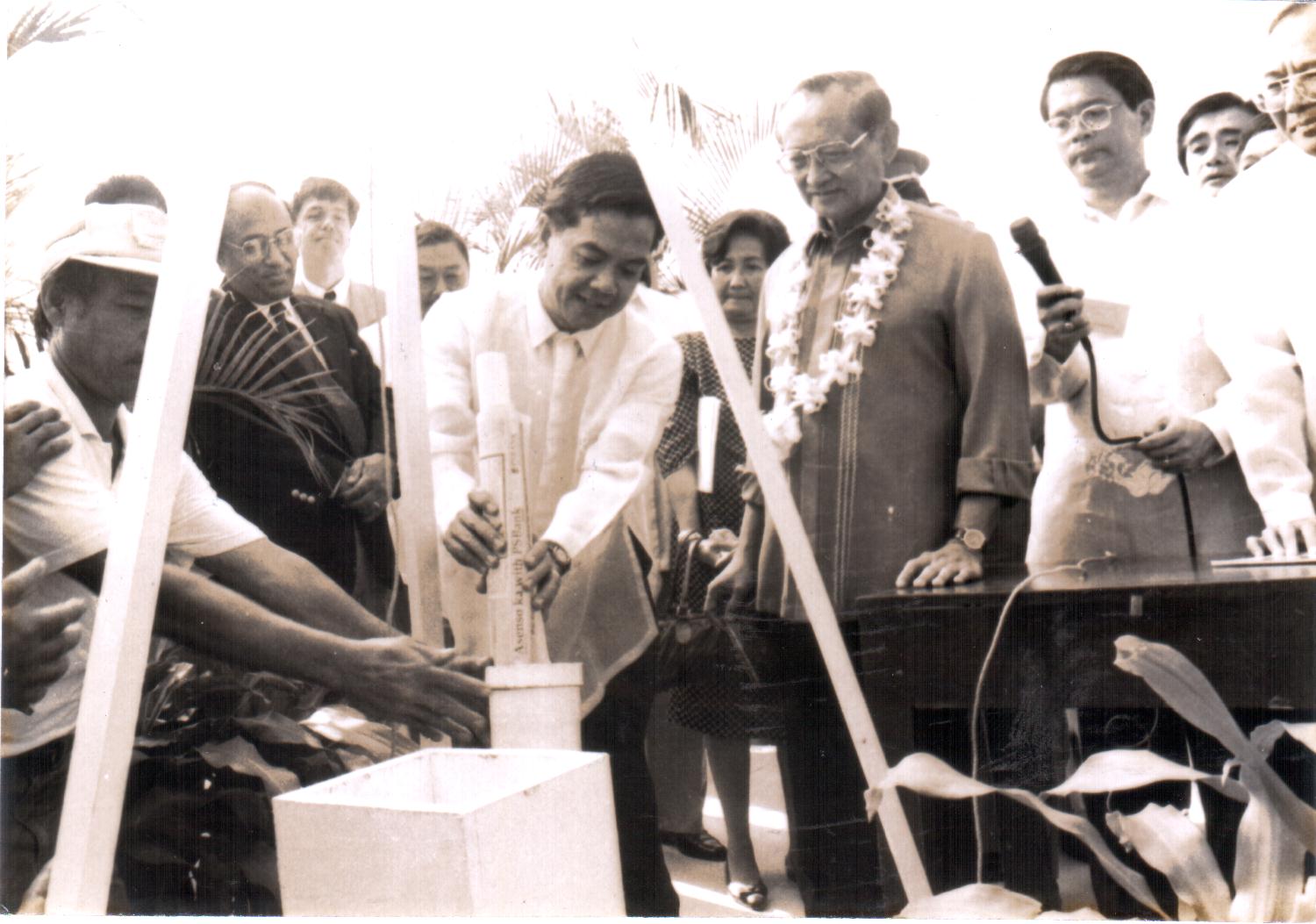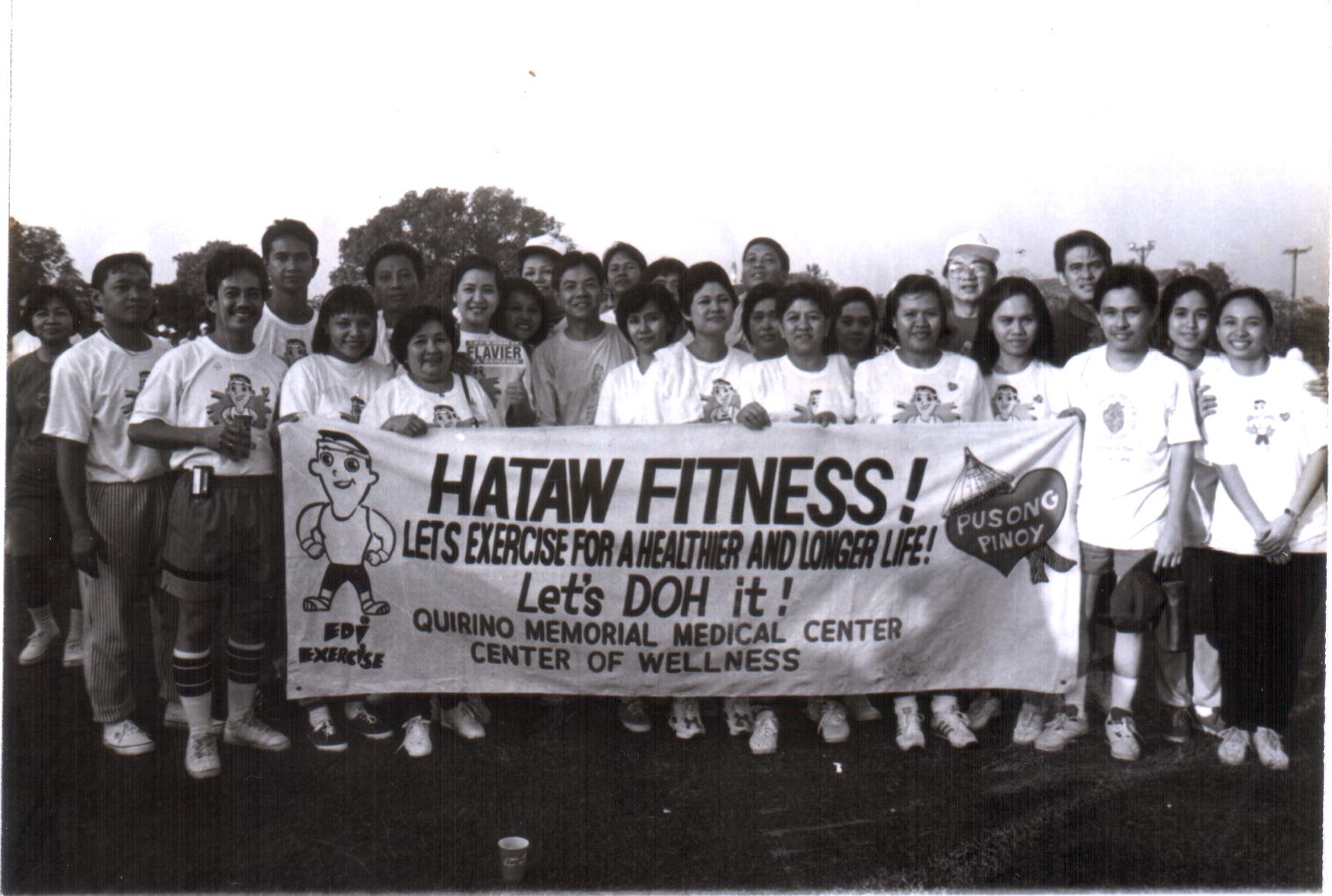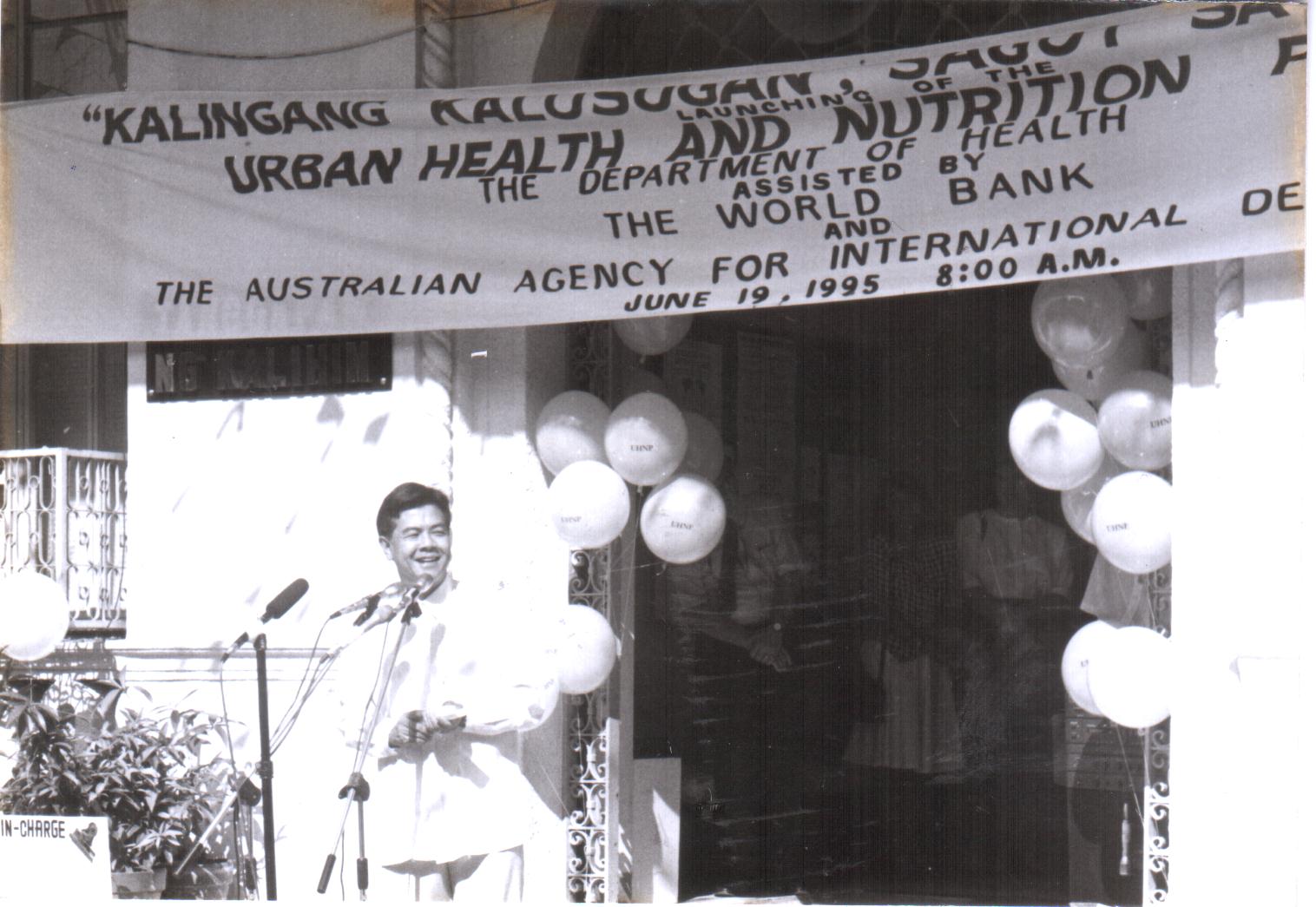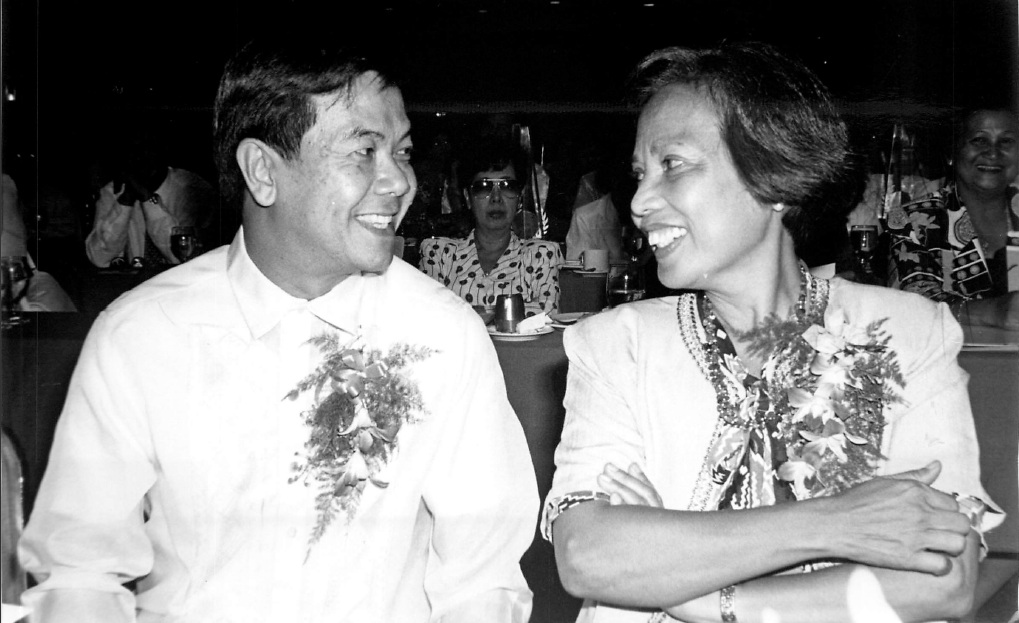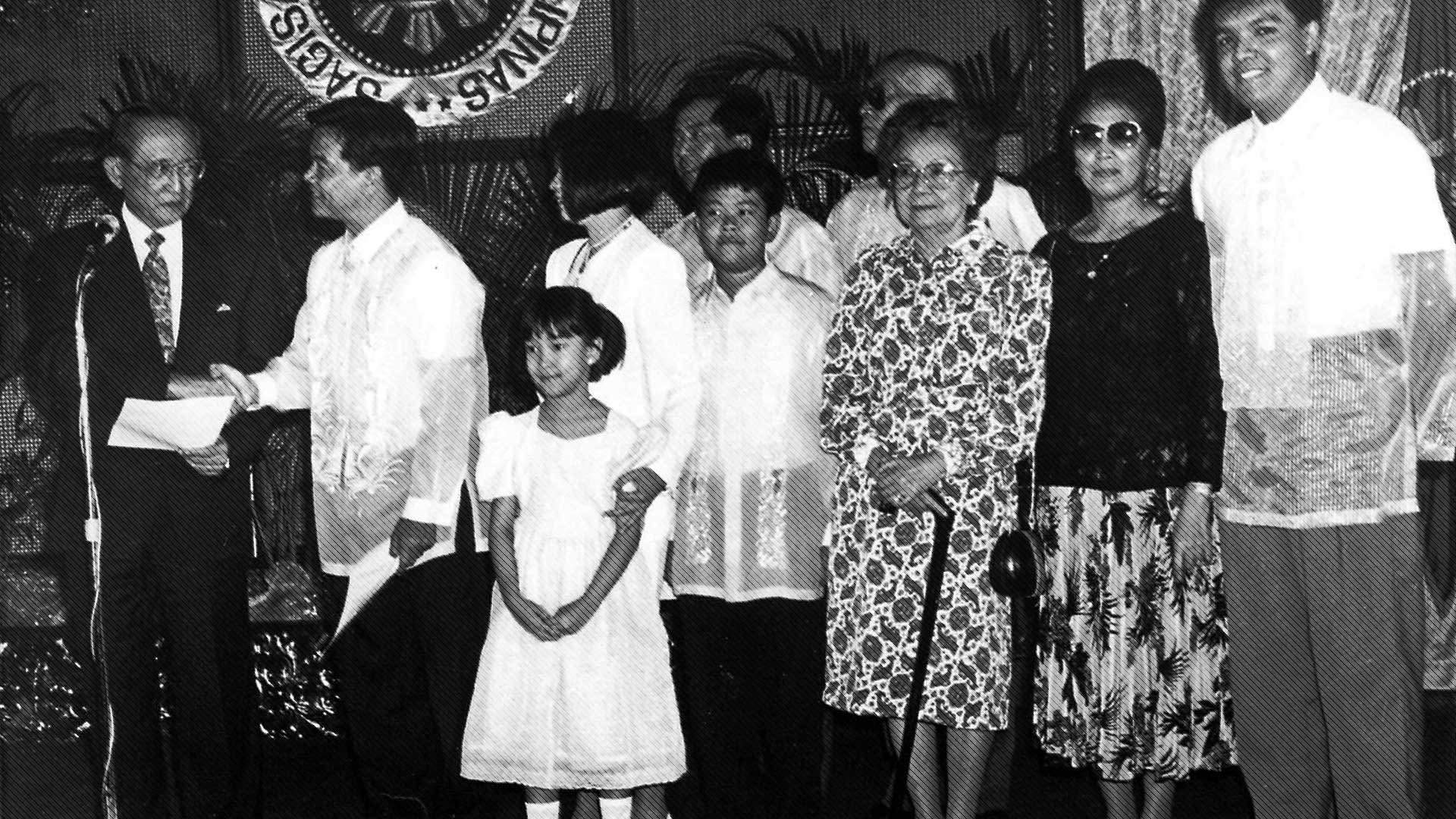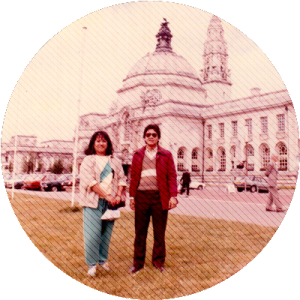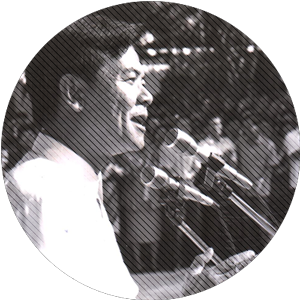Jimmy has been my mentor on providing an enabling mechanism for a people and for a community to empower itself towards the fulfilment of their rights and towards genuine health and development.
Dr Anthony GH Cordero
Dr. Jaime Z. Galvez Tan is a remarkable manifest of one man’s dedication, efforts and heroism to his country and countrymen. His sacrifice for the millions that remain uncared and unhealed makes him an outstanding doctor and an exemplary Filipino.
Get the latest Ebook of Doc Jimmy
Health in the Hands of the People: Framework and Action is a collection of Dr. Jaime Galvez Tan’s essays, reflecting over three decades of his work in the field of medicine and public health. Drawing from his experience from as far back as 1970s in the doctorless island of Maripipi in Biliran, the book tackles a wide range of issues that plague the Philippine Health System to this very day. It touches on the predominance of Western approach to diagnosis and treatment, economic, political and cultural factors that shape service delivery, the myriad of health system reforms implemented to diminish health disparities, among many others. It is a visionary piece that looks forward to the day when development of national and local policies, programs and services are more participative and responsive to the needs of the people, a time when grassroots leadership in health is the norm rather than the exception.
Download EbookExecutive Summary
THE WEST PHILIPPINE SEA was strewn with hues of blue and green and across stood the warm and sun-basked Sulu Sea, the long strip of land bears a rugged terrain of mountains and hills, its shores running towards the shoals and coral reefs. But not unlike Oscar Wilde’s The Picture of Dorian Gray, underneath the idyllic and ageless portrait lies the sinister face of great indigence, depravity and disservice. Health, a fundamental human right, is imperiled and left to disregard.
It was a trip to the island province of Palawan, the summer of 1968, that changed Dr. Jaime Z. Galvez Tan’s life—a memorable sojourn that served as an eye-opener, a looking glass that showed him the disconsolate state of the rural countryside where images of destitution and disease cascaded without intervention. For two months, he immersed in this neglected social reality and it was then that he took on the challenge of changing this uncontested picture. Adamant and unyielding to both rigor of serving thousands and temptations of a comfortable lifestyle, he started his calling as “doctor to the barrios” right after medical school.
Starting as the de facto Municipal Health Officer in the island municipality of Maripipi, Leyte in 1975, Dr. Galvez Tan, or Dok Jimmy to many, went on to various rural areas of Samar and Leyte partnering with the Rural Missionaries and dioceses developing community-based health programs and training health workers; then to Kalinga-Apayao, Cagayan, Cavite, Samar, Leyte and Davao del Norte to control tuberculosis through community-based programs with AKAP; to Agusan and North Cotabato with Health and Development Mindanao; moving on to take care of Luzon, Visayas and Mindanao with the UNICEF, Department of Health and Health Futures Foundation, Inc.
In the rural areas, Dok Jimmy literally lived in poverty like the majority of his patients. Despite these hard living conditions, it was easy for him to remain undeterred in fulfilling his mission: to empower the Filipino people. He practiced in doctorless communities with no electricity and hardly any transportation, slept in different homes, holding clinics in the morning and training health workers in the afternoon. Through hills and high-rise, through shores and slums, this doctor of the masses, this doctor for the Filipinos has endeavored and continues to endeavor health for all.
“I know there were so many people in need, so many places without doctors. I just had to go and move from one place to another,” he recounted. “I will stay in an area for a year or six months. But at the end of the year, I see to it that you will be empowered. You will know what to do with yourself even though there is no doctor.”
He is, as many UP College of Medicine students describe, “the personification of public health and community development in the Philippines”. A professor of the College since 1998, he has long been molding young minds in service to the Filipino people – as advocate of Return of Service for all health graduates of state colleges and universities, as Medical Patriotism lecturer and as mentor whose experiences serve as both motivation and inspiration. Hundreds of doctors have followed his footsteps, doctors who chose to stay in the country working as clinicians in hospitals, municipal health officers and health leaders to become pillars of our healthcare system.
From the hinterlands of Palawan and Maripipi, the expertise of Dok Jimmy has been tapped by international agencies for health and development. Taking root from decades of solid grassroots community work, extensive clinical practice and academic involvement, he also works as an international consultant on Health Policy Development, Health Planning and Health Systems Development and remains as one of the Philippines’ foremost expert in health systems, local goverment health development and integrative medicine.
Apart from being a mentor to future doctors, Dok Jimmy is also an active researcher and author, believing that studies are there not “for knowledge’s sake but to advance the well-being of the people.” Research, he confides, “should put the people and community in the heart of its all undertakings,” as sound science remains a precedent for successful policy development and implementation.
Throughout the years, Dok Jimmy stands true to his personal tenet, Country First, Self Later—a value that sets him apart from many of his peers. His service to the community and institutions for learning, along with the organizations he founded (trailblazing projects like the Alay sa Ginhawa at Kalusugan), have contributed to become exponents of social progress. In whatever he does, he continues to be guided by patriotic ideals, by the Hippocratic Oath of consecrating his life “to the service of humanity”, dedicating his career in healing those who have the least and motivating healers to join him in his strides.
“Emerging out of the Palawan experience I said, I will stay in the Philippines. I will not leave home.”
Country First, Self Later
Doctor of the Masses
Doctor of the Filipinos
The hills were overlooking the Sulu Sea and the sun glared directly overhead. The heat was prickling, the knees protesting, the grasses spread disinterestedly. Between copse, coppice and littering trees, a 20 year old young man sat to think.
It is like service is the other pea in the pod of Dr. Galvez Tan. At a very young age, Dok Jimmy, as he’s often called, has been doing outreach work in the poor areas of his community and church work.
That summer of 1968, Jimmy set out on a boat towards Palawan for a two-month medical mission sponsored by PANAMIN. It was his first time away from home, far from the comforts of his bed and far from the daily conveniences that he used to take for granted. From north to south, east to west, Jimmy together with eleven other volunteers spread across the hills and shores and scoured the vicinities of the island municipality.
On that hill, the young Jimmy pondered and asked himself. Why do I have to go abroad when there are so many people who need me here? The sunset that day became witness to Jimmy’s epiphany and shift in life direction. There he decided to walk on the road less travelled. At the end of the day, the Palawan experience became an antecedent of things to come. He concluded,
Emerging out of the Palawan experience I said, I will stay in the Philippines. I will not leave home.
“Jollibee of health”
The Humble Visionary
United Nations Children’s Fund
Later on, Dr. Galvez Tan would be directing programs for the United Nations Children’s Fund, sharing the talents that have benefited countless Filipinos with the world. From 1985 to 1992, he served as the Pacific and National Program Officer for the UNICEF (Phils.) Urban Basic Services Program, Nutrition, Children in Especially Difficult Circumstances, Area-Based Child Survival and Development Program. In 1995 to 1996, after his career with the Department of Health, he served as the Regional Advisor for Health and Nutrition for East Asia and the Pacific: providing technical assistance on child health and safe motherhood to 13 UNICEF Country Offices and Ministries of Health in the Region; managing the Mekong HIV-AIDS project funded by the Netherlands government; and designing and conducting annual strategic planning of the UNICEF Regional Office.
FriendlyCare: The Jollibee of Health
“What do Jollibee, Bench T-shirts and SM supermalls have to do with medical care?” asked Pennie dela Cruz of Inquirer Sunday Magazine twelve years ago. It turned out, the former-DOH Secretary was planning on building a “Jollibee of health”. Calling it FriendlyCare, Dok Jimmy extends his cause of a truly affordable health care to the masses by learning from successful commercial models in the country.A low-cost, high profile chain of sunny, client-friendly medical clinic where doctors don pastels instead of the sepulchral and ominous white, he conceived the clinics out of best practices culled from top moneymakers, recalling the tenet of a “business with a heart and a social purpose”. From its first clinic in Shaw Boulevard, FriendlyCare has multiplied to six clinics, including one in Cebu City and another in Davao City.
Clinic ng Bayan: Five-Star Clinic, One-Star Cost
Fourteen years ago, Dok Jimmy founded Health Futures Foundation, Inc. (HFI). Running to advocate and act “in the best interest of the poorest to achieve total health and development,” HFI was to formalize his vision of empowering communities and local governments in achieving access, quality and equity in health and development.
Since its inception, HFI has been involved in the design and management of health and social development programs, health sector reviews, health policy analysis, health planning and programming, qualitative health research and health governance.
Seeing the huge health inequity existing between high income urban areas and low income rural areas, Dok Jimmy launched Alay sa Ginhawa at Kalusugan (Alaga Ka), the banner project of HFI.
Alaga Ka aims to strengthen the Philippine healthcare system through the construction and renovation of barangay health stations, along with continuing professional education of health workers in the poorest communities nationwide (in partnership with local government units and the private sector). With a successful pilot BHS in Balete, Batangas and with one being constructed in Aborlan, Palawan, the project hopes to strike out the deficits in health stations across the nation—ending a deadly disservice that leaves millions without the opportunity to seek medical attention or primary health.
In a country where seven mothers die to childbirth every day, where tuberculosis kills 63 people a week and where four out of five villages fail to reach 95% vaccination coverage, aligning a collective vision with social reality is paramount.
The problem has been the same for decades and although the country is forecasted to be among Southeast Asia’s tigers, without prioritizing the health of its people, the archipelago of 7,107 islands leans on perilous waters. The actions of Filipinos like Dok Jimmy, ever-busy and ever-consistent with his ideals to improve the lives of his countrymen, provide hope: a justifiable optimism founded on the stories and anecdotes of doctors, of intellectuals, of innovators, of citizens that take their fellow Filipinos’ weal and good at heart.
As Milton ended Paradise Lost, “For the rest,—the world was all before them, where to choose.” Dok Jimmy has chosen and unlike the rest, he chose a small spot off a great world of opportunity. Starting on that small municipality of Biliran, vaulted by tides of Samar Sea and unknown to the rest of the country, he (a young doctor who could have specialized into whatever field he likes and could have been wherever he chooses) chose to remain. He must have been weary at first of that gamble 37 years ago, when he stepped out of that limpet-and-salt-encrusted boat, but it was for him, the right decision and the best that he could have made.
Furthering the Millenium Initiatives
Dr. Galvez Tan has greatly contributed in helping the country achieve the Millenium Development Goals. Through Alaga Ka” Project which seeks to construct and renovate barangay health stations in 5th and 6th class municipalities, Dok Jimmy has helped advocate for accessible basic health services especially in the poorest of the poor communities, which will greatly help in reducing child mortality, improving maternal health, as well as providing avenues in addressing problems of communicable diseases which is still very much present in the Philippines. The project also includes training of the local health personnel especially the midwives and BHWs, and overall, this project strengthens the health care system and, in the long run, will lead to better health outcomes.
He is also one of the main proponents for the Essential Health Care Package program which aims to provide and promote access to quality health care services for all Filipinos.
Dok Jimmy is also involved in the Consuelo Project on an evidence-based study, entitled Unwanted Pregnancies: Understanding and Action in Behalf of the Poorest Women in Metro Manila, showing the need to provide access to reproductive health as a means of improving maternal health and reducing unwanted pregnancies and abortions.
He has also actively sought solutions to address the brain drain affecting our country, proposing bilateral partnerships with Finland, Canada, and Australia to strengthen our health care system in exchange for our valuable human health resources.
With the knowledge and expertise he gained from serving the rural communities and doing projects with different organizations, his expertise has been sought and made available locally and internationally. He has worked as a consultant to the United Nations Children’s Fund (UNICEF), World Health Organization (WHO), United Nations Population Fund (UNFPA, United Nations Development Programme (UNDP), International Labour Organization (ILO), United Nation’s Educational, Scientific and Cultural Organization (UNESCO), World Bank, Asian Development Bank, The Australian Agency for International Development (AusAID), United States Agency for International Development (USAID), Canada Fund, Deutsche Gesellschaft für Technische Zusammenarbeit (GTZ), Japan International Cooperation Agency (JICA), Asia Foundation, Memisa (Netherlands), Cebemo (Netherlands), Misereor (Germany), Catholic Health Association of India, Asia Partnership for Human Development, Johns Hopkins University-Center for Communication Programs, Management Sciences for Health, International Institute for Rural Reconstruction, Mennonites (USA), the Development Bank of the Philippines and the Commission on Filipino Migrant Workers.
His consultancy work has ranged from health planning, health sector analysis, health policy development, health systems development, health care management, health procurement and logistics systems, public-private sector partnerships, health investment framework, program design, project appraisal, monitoring and evaluation, resource generation, capacity building and advocacy.
The countries of his consultancy work include: Australia, Bangladesh, Belgium, Bolivia, Cambodia, China, Egypt, Italy, India, Indonesia, Ireland, France, Germany, Ghana, Kazakhstan, Kenya, Kiribati, Laos, Malaysia, Myanmar, Nepal, the Netherlands, North Korea, Papua New Guinea, South Korea, Spain, Sri Lanka, Switzerland, Tanzania, Thailand, Turkey, the United Kingdom, the United States of America, Vietnam.
Among his landmark engagements that made impact in policy making are:
- Public Private Partnership in Health (PPP in Health) Philippines (SMEC International)
- The Access and Affordability Initiative (AAI) Project (Novartis Healthcare Philippines)
- Bioethics of Traditional Philippines Healing: Honoring Wellness in its Multicultural Modalities (UNESCO)
- Health Policy and Health Systems Development Specialist (ADB)
- Health Champion of the Philippine Services Coalition (DFA, Philippines-ITC, Geneva)
- Investment Framework for the Philippine Health Sector and Local Government Health Development (DBP)
Dok Jimmy has actively lobbied for the rights of special/marginalized populations and indigenous peoples such as the Blaan tribe in Southern Cotabato and Sarnggani in Mindanao. He has partnered with OPTEAM, a corporation in Finland and the UP School of Health Sciences Koronadal for scholarship programs for those young and determined students from the Blaan tribe who would otherwise not be able to afford a midwifery or a nursing course education on their own.
Dok Jimmy is presently working on the LakeHEAD Project together with the Research Institute for Humanity and Nature of Japan, entitled Managing Environmental Risks to Food and Health Security in Southeast Asian Watersheds. In this project, strategies on ecological risk management for sustainable food, water, and health security in the Laguna lake region are being developed. This October, six research papers with Dok Jimmy as Principal Investigator have been accepted in the International Conference on Ecology and Health in Kunming, China. These are all papers emanating from the researches done on the Laguna Lake watershed. This is a landmark study of the effects of ecological change and environmental degradation of the watersheds of Laguna Lake on human health and nutrition
During its first year of implementation, three research papers were also accepted at the World Lakes Conference held in Austin, Texas last November 2011. This is an example of how research results are actively produced with various stakeholders and translated into doable, concrete actions. Community owned health system improvement projects is the hallmark of a responsive health system.
Baja, con la luz grata
de las artes y ciencias, a la arena,
juventud, y desata
la pesada cadena
que tu genio poético encadena.
Come down with pleasing light
Of art and science to the fight,
O youth, and there untie The chains that heavy lie,
Your spirit free to blight.
The class starts and everyone is in white. The girls are in their skirts and the boys in crisp polo, the freshmen of the University of the Philippines College of Medicine sit in a room in Salcedo Hall. By the dais stands an empty faux-mahogany table and the last lecture failed to rub off completely the whiteboard. Then the professor walks in.
Like in all other classes, everyone behaves and someone wakes somebody up. The professor, a man who looks like in his early fifties (but is actually 64), smiles ear to ear adjacent sharp squinting eyes (an infectious grin somewhere between mischief and candor), wearing a bright fuchsia long-sleeves and carmine polka- dotted tie, tucked-in and belted.
Dr. Galvez Tan, in his familiar and inviting baritone, starts his lecture with the proverbial but unnecessary introduction. The students know him from peers and other professors, they heard of his intriguing story and they know that on that day, the usual descant of serving-the-country- first or realizing-the- Iskolar-ng-Bayan-privilege would resound again.
But it is different when it comes from Dok Jimmy: the banter gets a new color, more vivid and more real; the same words many have said that spun across the scratched and lazy vinyl floor of the room and similar rooms and halls of UP coalesce into something more convincing, something more empathic. There are no tirades of colonial mentality or no rants on treason, only anecdotes of experience and the enthusiasm of sharing one’s passion. His lectures either end in applause or an ovation, but always with the same grin where he started. This time, he gets the latter.
The subject : Medical Patriotism
“I can still vividly recall the very first lecture-workshop he gave to our class back in 2004 where he clearly laid down the principles of traditional, community oriented, community-based and community managed health system models,” Dr. Paolo Victor N. Medina, UPCM Batch 2009 and now Municipal Health Officer of Alabat Island, Quezon, shares.
“In retrospect, that lecture changed my life and shaped my pursuit for knowledge and self-actualization throughout med school. I wasn’t aware that he was a former Secretary of the Department of Health back then. When I eventually came to learn more about his reputation and career, I knew then and there that I had a role model,” he added.
Enspiriting Generations
Dok Jimmy has been a Professor at the UP College of Medicine since 1998. Before that, he served as a visiting lecturer from 1975 to 1985, while working in various rural and urban areas designing and planning community-based health programs for dioceses, farmers’ groups and civil society organizations. As a visiting lecturer, he provided insights and perspectives in rural community medicine and the management of community-based health programs. Through a slide show, Dr. Jimmy shared his struggles and conflicts as a hospital-trained physician working in far-flung doctorless communities and even then, invited students to join community-based health programs after their graduation.
Earlier on, just after he graduated, Dr. Jimmy worked as an Assistant Professor in the UP Institute of Health Sciences, Research and Development Department Underboard Physician Programs in Tacloban City from 1976 to 1978. Together with its national and local team, he designed and implemented the step-ladder curriculum in producing community health workers, midwives, nurses and doctors for rural communities in the country—a revolutionary idea in medical education and an endeavor supported by the World Health Organization and the Kellogg Foundation. Coordinating with medical institutions in Samar and Leyte, he conducted special six-month training programs for under-board physicians wherein they acted as Municipal Health Officers in doctorless towns.
Apart from Medical Patriotism, Dok Jimmy also teaches traditional and complementary medicine to 6th and 7th level students as an elective; Integrative Medicine as a semestral subject in the Masters of Science in Family Medicine; and gives lectures on health management, health policy development, community-based medicine and traditional medicine in the undergraduate curriculum.
As an active faculty member, Dok Jimmy initiated medical education reforms in the UP College of Medicine (CM) curriculum with the introduction of a Community-Oriented Medical Education (COME) Program. He was Vice-Chair of the College Curriculum Committee since 2002 and a faculty advocate for gender and reproductive health.
An integral member of the University of the Philippines Manila (UPM) community, Dr. Galvez Tan has served various posts in the University including as Vice Chancellor for Research and Executive Director of the National Institutes for Health. Through these positions, he directed and managed the institution’s research endeavors from 2002-2005: initiating the participatory formulation of the University’s research agenda and that of the National Institutes of Health’s (NIH), initiating electronic database management of research information and concretizing the research endowment fund for the NIH and the Philippine National Research System.
He has chaired the University External Linkages Committee and the College of Medicine External Linkages Committee from 2000 to 2002 and as part of the College of Medicine’s 100th Anniversary, organized the Centennial Colloquium of former Secretaries of Health in 2005. Beyond the University of the Philippines, Dok Jimmy has also been a lecturer in the Asian Institute of Management’s Health Care Management Program since 2001.
Urging on Future Examples
Twice a semester, Dr. Galvez Tan would hold a merienda cena dialogue with a score of medical students inclined to work in the community. These merienda cena has given birth to students who have become Municipal Health Officers (MHO), community oriented specialists, local and international health and development consultants and faculty of the College of Medicine.
These community doctors have since banded to form the careershealth.ph to further promote the cause to stay and work in the Philippines.
He alludes to the adage, bella esperanza de la Patria Mia. “The fair hope of the Motherland” was how the country’s most famous physician describes the youth. In his A la Juventud Filipina, Dr. Jose Rizal urges on:
de las artes y ciencias, a la arena,
juventud, y desata
la pesada cadena
que tu genio poético encadena.
(Come down with pleasing light
Of art and science to the fight,
O youth, and there untie The chains that heavy lie,
Your spirit free to blight.)
Dr. Galvez Tan knows this fully well.
The potential of the generation could not be put to waste or set aside. Great promise lies within and lies in store for the next doctors of the country. The solution to the age-old problem that millions of Filipinos face, the lack of quality healthcare service and the neglect of their fundamental right to health, lie in the next batch of scholars. Through the “art and science” of Medicine, they can “untie the chains” that have for so long been a menace.
Among his protégés are professors, policy-makers, think-tanks, development experts, researchers, politicians, professors, researchers, local and national public servants, community-oriented clinicians, technical experts and many more. These physicians are now in every part of Filipino society from the grassroots and barangays, to regional offices, NGOs, the Department of Health and other national departments and international organizations.
We were all inspired by Dr. Galvez Tan ‘s leadership and passion for service and excellence. For me, this is his best legacy. His mentorship was the force that bound us to see things that are greater and bigger, giving hope to the future of the Filipino people.
Even as a role model, JGT is not the stereotypical image of a doctor. He prefers pastels and bright colors to the starchy and rigid white of a hospital coat. He kids and jokes. He is as engaging as the next photo op organizer or the “wacky pose” initiator. He realizes that there is more to being a doctor than the sterility of scalpel blades and skin retractors—sometimes, to heal, one has to get dirty and muddy traversing rough trails.
“For many of his students, Dr. Galvez Tan has become synonymous with public health and community medicine, which is actually not far from the truth. It is difficult to not be inspired by the man whose kilometric list of achievements is perhaps only outmatched by the gratitude of the people whose lives he has touched along the way. And yet, despite his many successes, he remains humble and unassuming, still fresh and eager with new ideas to help improve the country’s health care system,” Dr. Rene Andrew A. Bucu, UPCM Batch 2008 now with UNICEF, shared.
A true visionary and outstanding leader in his field, Doc Jimmy has worked tirelessly in his personal mission to improve the health outcomes of his countrymen in the Philippines. By his example, Doc Jimmy has inspired and will no doubt continue to inspire more people to take up his cause in working towards health for all Filipinos.
From his young career up to now, he has been a champion of the Filipino masses – serving in rural communities, advocating for the health rights of indigenous people and advancing the cause of universal health care for all Filipinos, I have witnessed first-hand how Doc Jimmy has cared for and molded young minds like mine into being the best person that we could be. He has not only showed me the importance of medical knowledge but also how to genuinely look after the well-being of another person and of the community as a whole.
Dok Jimmy continues what he has long started and with the years that he has invested, and continue to invest, in molding the next leaders of community health. Like that lecture that among many he gave at Salcedo Hall, among the young faces oblivious to what is ahead but expectant of the challenges and opportunities, among futures colleagues and the next great doctors of the country, Dr. Galvez Tan echoes the beacon-call that centuries ago was cried:
¡Alza tu tersa frente,
juventud filipina, en este día!
¡Luce resplandeciente
tu rica gallardía!
Cathy Cheng-Soña
“the golden years of the Department of Health.”
Dr. Jaime Galvez Tan’s career in health leadership has proven both fruitful and invaluable to contemporary health systems management in the Philippines. He was one of the primary authors of the draft bill on creating the Philippine Health Insurance Corporation during his stint as Undersecretary of Health 1992-95 which already conceived of a Universal Health Care for all Filipinos by 2010.
He led the review of the researches done (1988-1992) on health financing especially the critique of the then Medicare institution. The review led to the concept of creating a new institution (PhilHealth) to ensure access, quality and equity of health care in the Philippines.
Through a well calculated strategy plan of 16 months of campaigning within the Cabinet and President former Fidel V. Ramos, followed by the introduction of the draft bill in the two Houses of Congress, a series of 1,000 consultations with all stakeholders all over the country and an operational research of a decentralize health insurance system in Bukidnon and Guimaras provinces, the PhilHealth Bill was passed in Congress in January 1995 and signed into law by former President Fidel V. Ramos on February 14, 1995.
DOH’s ‘Golden Era’
The revolutionary health agenda was the brainchild of Dr Dr. Galvez Tan, then Undersecretary and Chief of Staff and then Sec Juan M Flavier to what journalist Cathy Cheng-Soña describes as “the golden years of the Department of Health”. At the time of the passing he PhilHealth bill and the signing into a law, Dr. Galvez Tan had already assumed the position of Acting Secretary of Health.
He also established the Local Government Assistance and Monitoring Service, Traditional Medicine Unit, Urban Health Development Unit, Disaster Management Unit and the integration of family planning into reproductive health, maternal and child health care, nutrition and dental health divisions of DOH; and revitalized the DOH’s Primary Health Care as the foundation for planning and management, Standards, Licensing, Regulations and Quality Assurance, and the partnership between the DOH (through the Essential National Health Research and Development.
In his years as Undersecretary and Chief of Staff from 1992-1995, he was responsible for the management of the many programs; among them:
- Vision of Health in the Hands of the People 2020
- The 25 Year National Health Plan (1995-2020)
- The 10 Year Health Investment Plan (1994-2003)
- Health Human Resource Development Policy
- Bi-annual Program and Budget Review Process, Step-Ladder, Multi-Track Curricula for Health Sciences Education
- Hospitals as Centers of Wellness Program
- Traditional Medicine Policy, Women’s Health and Safe Motherhood Project and Integrated Community Health Services Project.
As Secretary of Health, Dok Jimmy initiated the following:
- The Great Filipino Workout: A National Exercise Program
- Health for the Productive Labor Force (Healthy Workforce, Healthy Workplaces)
- Heal the Healers Program
- TKO Kontra Kolera (“Tubig, Kubeta, Oresol” or Water, Latrines and ORT): A National Campaign for the Prevention and Control of Cholera and Diarrhea
- National Review of the Generics Act of 1988 and the National Drug Policy Program of 1987
- Constitution and Convening of the Philippine Health Insurance Corporation Board of Directors; and
- Moral Recovery Program in the Department.
Dok Jimmy also initiated the formation of the Implementing Rules and Regulations of the following:
- Republic Act 7170 or the Corneal and Organ Transplant Act
- Republic Act 7883 or the Barangay Health Workers Act
- Republic Act 7719 or the National Voluntary Blood Donation Act, and as mentioned
- Republic Act 7875 or the National Health Insurance Act.
A Healthier Philippines
His body of work on Health Human Resources Development continues to be quoted, especially his landmark papers on Doctors Becoming Nurses (2004) and the Ethical Guidelines in the Recruitment of International Health Workers, The Impact of Diaspora of Filipino Health Professionals on the over-all health care delivery system of the Philippines, research studies on medical education (from Idealism to Pragmatism).
Dok Jimmy is currently working on the Philippine component of a research with the University of Ottawa, entitled, “Source” Country Perspective on the Migration of Highly Trained Health Personnel: Key Informant Interviews in South Africa, Jamaica, India and the Philippines.
Presently, Dok Jimmy is one of the strategic thinkers in establishing the Coalition 162 to 52 to fast track the achievement of MDG5: lowering maternal mortality and promoting maternal health. Together with the Zuellig Foundation, the Philippine Business for Social Progress, Sanofi Pasteur, Dok Jimmy representing Health Futures Foundation, Inc., joined this core group to mobilize all stakeholders especially the Department of Health and PhilHealth, together with Local Governments (Union of Local Authorities of the Philippines, League of Provinces, League of Municipalities, League of Cities) and more than 200 civil society organizations in establishing the Coalition 162 to 52. The Coalition is now in its preparation in launching the action projects in 32 priority provinces.
Dok Jimmy continues to speak of health as a human right. He continues his involvement as Board of Trustees of the Philippine Cancer Society, Child Hope, CFSI, the NORFIl Foundation, the Medical Action Group, Galing Pook Foundation, Movement for Good Goveranance, Visayas Primary Health Care and consultant to Zuellig Family Foundation which gives the opportunity for him to share his views on accountability, transparency and equity in goverance of health and protection of health as a human right. This belief is firmly rooted in his long experience as a rural doctor.
Empowerment through Evidence
As a policy maker, Dok Jimmy understands the value of empirical evidence and the soundness of science in directing actions. Speaking in the recent Community Forum 2012, Partnership in Saving Laguna de Bay: Community-based Health, Food and Ecological Risk Communication and Early Warning System, he stands by the dictum “to pursue research for knowledge’s sake but to advance the well-being of the people.”
Dok Jimmy currently heads the Chairs of the Technical Work Groups of thehead Philippine National Health Research System (PNHRS) composed of the Philippine Council for Health Research and Development (PCHRD), DOST, DOH, CHED and the National Institutes of Health in UP Manila. He is Chair of the Resource Mobilization Technical Working Group of the PNHRS in charge of generating a sustainable fund of initially P1 Billion for health research and development in the Philippines. He has gotten the endorsement of Secretary Butch Abad of the Department of Budget and Management and the support of Congressman Jun Abaya of the Lower House Committee on Ways and Means and Congressman Alfredo Maranon III of the Lower House Committee on Health and Senator Pia Cayetano of the Senate Committee on Health for a sustainable health research fund for the PNHRS.
As principal investigator, Dr. Galvez Tan also led a multi sectoral group of health social scientists on the study of Community Leadership in Reproductive Health and Development among the poorest in 10 ethno-liguistic groups and areas of the Philippines. The research was presented at the Bill and Melinda Gates Institute in the Bloomberg School of Public Health of Johns Hopkins University in Maryland, USA in 2007. A book has been published on the results of the research funded by the Bill and Melinda Gates Foundation. The book has been made available to all local governments of the Philippines.
Man is composed of body, mind and spirit.
Man is composed of body, mind and spirit. Taking into account this and the interplay between the man, the environment, emotions and relationships, Dok Jimmy utilizes a holistic approach to healing. He not only heals the body but also the mind and the spirit. For the body he prescribes herbal and food medicines alongside mainstream medicines. For the mind, he teaches yoga, meditation and visualization. For the spirit, he recommends affirmation, forgiveness therapy, laughter and happiness therapy, among others.
Dok Jimmy leans on empowering his clients, guiding them to take charge of their own health while working with the physician, helping the body heal consciously and with optimism. He is also fervent in emphasizing wellness and prevention of disease. He not only includes mainstream or Western medicine but also pulls from the tenets of evidence-based practices in Filipino traditional medicine and alternative medicine. As early as 1980, he has been active in the practice of acupuncture, acupressure and herbal medicine—three modalities that he has found to be both effective and inexpensive to address the health predicaments of clients.
He holds free consultations at the PGH Outpatient Department where he heads the UP-Philippine General Hospital Traditional and Integrative Medicine Clinic. On other days, the clinic is manned by other acupuncturists whom he has trained or have done further study in China.
Dok Jimmy also hosts a daily radio program Doctor’s Orders at DWWW 774 AM wherein he continues advocating prevention, wellness and a healthy lifestyle. In addition to this, every month on a Saturday, he holds free wellness lectures at the Bayan Academy. He has also shared his knowledge nationwide through the many invitations to speak on wellness by both government and private organizations.
In the effort to advance and upgrade the practice of acupuncture, he founded together with other acupuncturists the Philippine Academy of Acupuncturists, Inc., an association providing training and education in acupuncture. He is also a member of the Board of Directors of the Philippine College for the Advancement of Medicine.
Dok Jimmy is an exponent to the study and practice of Filipino traditional massage or hilot its international recognition of traditional Filipino healing modalities. He likewise served as consultant for the Health Champion of the Philippines Services Coalition of the Department of Foreign Affairs and the International Trade Organization (2005-2006), formulating the design analysis for Philippine ‘medical tourism’ and highlighting Filipino competitiveness in complementary and alternative medicine.
Live simply
Reach for the Stars
Give without counting the cost
Give unconditional love
The Loving Family Man
Dok Jimmy is the third of seven sons of Dr Jesus Javier Tan and Aurelia Galvez. From his father, he learned the value of sharing, humility and service. While of Chinese lineage, his parents brought them up more Filipino than Chinese thus at a young age, the seed of being Filipino was planted in the spirit and identity of the growing Dok Jimmy.
Dok Jimmy later met and married Ma. Rebecca V. Maraña, a student then at theUP College of Nursing. They have two ch ildren: Ginoo Karlo now a resident physic ian at the UP Philippine General Hospital and Riva Maria, a social entrepreneur.
Being the man for others that Dr. Jimmy is, the family had to learn early to share him with the rest of the Filipino humanity, if not the world. This means contending with a very hectic schedule and scores of people asking for a piece of Dr. Jimmy’s attention and time. In spite of this, they have remained strong and supportive, working with the padre de familia to further the cause of empowering Filipinos and improving health all over the country.
From their own words, he has imparted the following to his children by example:
Live simply
“He doesn’t obsess himself with the usual toys or hobbies for the big boys—cars, gadgets, watches, among others. He would rather spend his time and money on acts of service that would be for the good of his countrymen. He would not buy something for the sake of keeping up with the trend. As long as it works for him, he would still use it. Moreover, he’s definitely not the type to purchase one watch after the other just to complete a collection that friends would eventually drool over. In fact, he’s been using the same watch since God knows when. The only time anyone would see him sporting a branded something, is because it has been given to him. For him, making a positive difference on people’s lives trumps owning all the material things the world can offer.”
Reach for the stars
“He would always encourage us to be bold and daring, even if it entails a lot of consequences. We are always inspired by his fighting spirit when it comes to advocating out-of-the-box and ahead-of-its-time ideas. He was never afraid of being criticized for what he believes in because he knew it was for the betterment of our nation. He was confident that at the end of the day, he was pushing for something not to bolster his own image but because it’s a movement definitely worth starting. Despite several crises that hit our country, not one second of his life did he lose hope for our nation’s progress. While many have packed their bags for greener pastures, he continues to envision how it’s possible for the Philippines to be at par or even better than its South East Asian rivals.
“The trailblazer that he is, we recall an instance when he told us that he was pushing for the benefits of using malunggay some thirty years ago. Many were skeptical about how a plant that’s found everywhere can have such wonderful medicinal properties. It was only in the last five years when that thought finally entered the consciousness of the public. Fast forward to present time. It’s now becoming a phenomenon.”
Give without counting the cost
“Our father has always been generous, many times to a fault. No one would ever feel short changed because he really gives his all, without asking for anything in return. He would always be “on-call” for everyone, not just to his patients. He would willingly go out of his way to travel several hundred kilometres just to heed the call of a person who asked for his help. He’s a certified workaholic not because he wants to enrich himself, but because he wants to give more. If he could teleport from one place to another with a snap of a finger just to be able to reach out to more people, he would. If he won the lotto, I’m sure he would allocate most of the proceeds to people in dire need of his help. For him, the most fulfilling moment would be to see a smile on the faces of the people he extends his help to. A simple word of gratitude is more than enough to fill his heart with so much joy.”
Give unconditional love
“Whether he’s physically present or not, we’ve always felt how much he loves us. He has always been very supportive of our endeavors. No matter how hectic his schedule is, he would always send us daily affirmations for us to stay positive all the time. When there’s a special occasion, he’d make an effort to buy us a gift which makes it even more special knowing that he doesn’t go shopping. When I need to ask a favor, as long as it’s reasonable and realistic, he would never turn us down. When he wants to teach me a lesson, he calmly talks to me to bring up his concern. He would always lend an ear and give his two cents’ worth.”
SHARING THE EXPERTISE FOR A HEALTHIER WORLD
The speaker approached the podium with an inexpensive pen and a distended notebook. The livid fluorescent lamp above gave the ineffective semblance of a limelight. Adjusting his glasses, he started the usual introductory short-bio for the Keynote Speaker, condensed from the 37-paged curriculum vitae. “Our speaker has the rare combination of the following expertise: solid grassroots community work in far-flung doctorless rural areas…” He would cough, he would pause, he would deviate from his script every now and then, interposing personal experiences with rote but lively reading. At the penultimate paragraph, after testing the waters with dramatic silence, he quipped in Filipino, a candid climax to his address’s crescendo, “Our speaker has been in so many places that perhaps the only place he has not been to is Mars!” Everyone rushed to laughter and he finished his introduction, “Ladies and gentlemen, it is with great honor and privilege that I welcome to you our Speaker, Dr. Jaime Z. Galvez Tan.” The audience stood and the screen flickered to life, revealing a PowerPoint slide with a community nurse back- dropping the words “Who Will Heal Us Now?”
It was at the Asian Institute of Management in Makati City and Dok Jimmy was to talk about health human resources. The conference room stood still and seats graduating from the rostrum to the doors ran filled. The air-con hummed cooperatively. Representatives of the Department of Health, the academe, civil society organizations, various health professions and even Board of Nursing Member Hon. Marco Antonio Sto. Tomas were there to listen as Dok Jimmy presented startling, but widely publicized, facts about the inadequacy of our health services in many parts of the country. He was presenting news in a different light. Distinguished professors of the University of the Philippines, including former Health Secretary Alberto Romualdez, Jr. and Ramon Magsaysay Awardee and National Scientist Dr. Ernesto Domingo graced the event.
With statistics and rhetoric, hinging from years of public service and decades of teaching and clinical and community practice, he regretted a woebegone reality unchanged and unchallenged, “Our nurses have left, are leaving and will leave our country in their understandable search for greener pastures.” He shared where they have been, where they are and where they are bound to go. He knows; he has been in pretty much all country that we can (for the lack of a more true-to-substance word) export Filipino nurses in.
Dok Jimmy is, paraphrasing from the steel-magnate Lakshmi Mittal, a citizen of the world. He is a Filipino who has not hesitated to share what insights and values he has gained from a lifelong fruitful learning to both hemispheres. He has been in the five habitable continents of the world, trotting the world as invited guest, as representative of the country, as speaker, as distinguished member, as part of the board, as consultant, as educator.
A product of world-class and international education, Dok Jimmy is a Fellow of the Bill & Melinda Gates Strategic Leadership and Management of Population and Reproductive Health of Johns Hopskins Bloomberg School of Public Health in Baltimore and an alumnus of Prince Leopold Institute of Tropical Medicine in Antwerp, Belgium (where he received his Master in Public Health, with honors).
He, has indeed, as that AIM speaker declared him to be, been almost everywhere but space. The same “Introduction to the Speaker” speech adds weight to this premise. It mentioned, “He acts as consultant to WHO, UNICEF, UNDP, UNFPA, ILO, World Bank, Asian Development Bank, AUSAID, JICA and USAID, bringing him to Europe, Asia, the Pacific, Africa, Latin America, Canada, USA, Australia, New Zealand, Kazakhstan and Russia.” Doubtless the enumeration has not been updated since January of 2013 when that conference was done (no, Mars is still not included).
Despite the travels all over the world, he sees to it that he returns home to share and apply what he learned in foreign trips in addressing the country’s problems. It is, in fact, a reciprocal engagement. Each of this country offers Dok Jimmy profound insights to diverse issues that do not consider geographical boundaries or artificial classifications: diseases like lymphatic filariasis, gender discrimination, malnutrition, poor maternal and child health, inaccessibility of medicines and many more.
An “old” curriculum vitae (last updated on 2005) lists “Countries of Consultancy Work”, finds in alphabetical order— Australia, Bangladesh, Belgium, Bolivia, Cambodia, China, Egypt, Italy, India, Indonesia, Ireland, France, Germany, Ghana, Kazakhstan, Kenya, Kiribati, Laos, Malaysia, Myanmar, Nepal, the Netherlands, North Korea, Papua New Guinea, South Korea, Spain, Sri Lanka, Switzerland, Tanzania, Thailand, Turkey, the United Kingdom, the United States of America and Vietnam. Early in his career, he has been active in international engagements as a consultant of UNICEF and UNDP. His work brought him to Netherlands, West Germany (Germany has not even been reunited then!), Bolivia, China, Cambodia, Turkey and the Kiribati Islands. In between these countries, he would be in Basilan, Samar and Manila, facilitating community-based health programs or joining in expert panels for policy formation. Later on, he would join a host of international aid organizations in line with his expertise on health policy development, health planning and health systems development. Borrowing from the same source and just before the “Countries of Consultancy Work” list, we read a dozen sub-themes of health research.
More recently and in less than a year, Dok has become the Research Institute for Humanity and Nature’s Visiting Research Fellow, spending three months in Japan, starting his tenure with the Cherry Blossoms (which he tells us has only witnessed once, despite his more than 30 trips in the country). There, he has lectured in three cities, among professors in the prolific and novel transdisciplinary field of Ecohealth (the integration of environmental science and health sciences). He had visited Kunming, China to attend an international conference on the same field (as one of the country’s foremost expert), as well as Malaysia. In Vietnam, he provided a comparison of the country and Philippines’ health systems as one of our preeminent expert in health development (indeed, just last year, he was awarded as one of our country’s Eminent Filipino Physician). Before spending his 65th birthday, he was in Myanmar.
His collection of more than half a dozen passports would attest to his sojourns, as do his pasalubongs. From the easily-tampered passport the DFA released to the ones with modern security features, his collection merits exhibition in DFA museum. One of his passports even had expanded with a concertina- folded refill. His active passport is on its last few pages. His Japan trip brought with him a box of Kitkat Matcha Green Tea flavour (a change from the only four flavors of the chocolate wafer in the Philippines, in contrast to the more than 15 varieties of Japan).
The irony of this nationalistic globetrotter is admirable. Dok Jimmy harmonizes the oxymoron in “global citizen”, a world class consultant who strives to internationalize the Filipino experience, thought-provoking and insightful far and near. The introductory speaker was wise in his retort, he has been everywhere. Finding, though, that the struggle for a more health- equitable world is far from settled and how the Philippines can still learn so much from our neighbors, it would not be far-fetched to await the application for another passport.
In a few months’ time, he will be off to South Korea to give a presentation on community-based health sciences education. Sure enough, the teaching and learning continue.
GUIDING, MAKING AND CHANGING HISTORY
The Daring Innovator
The challenge of the Philippine health scene is that the greatest of our problems have remained to be the same for generations. In Noli me Tangere, Rizal talked about how people would drink holy water to cure illnesses that are still prevalent today. Alfonso Linares, Maria Clara’s suitor contending with Crisostomo Ibarra, died from dysentery. Diarrhea is still a serious family burden in the country. Past three colonizers, four Constitutions and two world wars, we have yet to be adjudged if we have made any progress in changing not only the stark scenery of diarrhea, but children’s health in particular and public health in general. Our history, nonetheless, evinces that sporadically, there are men and women who see beyond the illusions of currentness to take arms against what has before been merely gleaned upon. They accept the onus of changing a status quo we have acquiesced upon to our own disaster. In many fields of services, a few Filipinos have looked back and referred to the past, but instead of surrendering, saw in it their destinies and envisioned a common destiny for millions more. Visionaries like Dok Jimmy contemplate what we can achieve against what we have lost, or what continue on losing.
A comment-in-intervention was filed to the Supreme Court En Banc at the early days of Imbong v. Ochoa. The petition, consolidated with half a dozen others, form the legal obstacle against the implementation of a recently-passed (but more-than-a-decade formed) law. Dok Jimmy, intervening with fellow former-Department of Health Secretaries Dr. Esperanza I. Cabral and Dr. Alberto G. Romualdez, Jr. were fighting for the constitutionality of the controversial R.A. 10354. The “Responsible Parenthood and Reproductive Health Act of 2012”, or better known through its moniker ‘RH Law’, is set in an arena of clashing beliefs, information asymmetries and polar interpretations of social justice and national development.
They argue for the statute’s validity, “It is consistent with the constitutional right to privacy. It is in furtherance of the Philippines’s state obligations under international law. It does not violate the freedom of religion. It does not violate the right to life.” Through distinguished counsel, UP Law Professor Elizabeth Aguiling-Pangalanan, Dok Jimmy raised his official capacity as then-Health Secretary as locus standi, that is, he can validly assert a legally- demandable and enforceable right that stands to be impaired with the law’s non-execution, “Intervenor […] issued AO 1995-6 defining the roles and responsibilities of key DOH management personnel for the Integrated Family Planning and Maternal Health Project.” The fight, not yet concluded by the Honorable Court (although two status quo ante orders have been passed), promises to foment more discussions on the State’s police power among academic circles, the separation doctrine in broadsheet commentaries, the right to determination (as “ripened” by a health workers’ autonomy or a couple’s clinic visit) among shirtless street-side drinking sprees and incorruptible dogmatic morality in homilies. Beyond the arguments, the footnotes of case law and the snippets of the 1987 Philippine Constitution, however, the 35-paged paper evinces to an interesting history— one that Dok Jimmy has helped to create.
Among the legalese, the legacy of Dok Jimmy as an innovator for Filipino health and wellness stands bright. The man who “started and brought us Universal Health Care”, lauds 2013 Ramon Magsaysay Awardee Dr. Ernesto Domingo in a conference on Kalusugang Pangkahatan, who “without whom, we would not have this program”, (statement at the Health Secretary’s Cup 2013, 24 January 2013) has contributed greatly to the cause of planned and responsible parenthood. The contentious juridical, and even philosophical, arena rests on many bricks that Dok Jimmy had laid.
While serving under public trust, he introduced novel and pragmatic solutions to archaic problems of the Filipino health scene, catalysing programs that after his post would unfortunately gain momentum only years later. The family planning strategies of the DOH under Secretary Juan Flavier (who would later on become Senator) and under Dok Jimmy energized the efforts of the department since nascent policies for family planning in the 70s, so much so that the CBCP, called the former a devil’s handmaid, even threatening excommunication. Undaunted, the two sided with their conscience and advocated for a nation where every family can feed, clothe and educate their children.
Although the country is unlikely to meet its Millennium Development Goal on improved maternal health, modest efforts have been made by today’s government to stop 30 children from being motherless every day. Such actions do not veer far from the efforts that almost three decades from now have been strongly pursued by the DOH, with Dok Jimmy in its steer and helm. Despite what many has thought only as doomsaying, Filipinos would later on realize the value of this proactive response. According to the UNFPA, for example, “At this pace of reduction [of maternal mortality rate or MMR], by 2015 MMR will have only declined to 140 and the target of 52 will be unachievable” (UNFPA, Will Philippine women continue to die during childbirth?). Seeing yet again the redux of what he and the general public (through its duly elected representatives) feel as an insult to the cause of preventing further deaths, Dok Jimmy can’t help but be called to action. Perhaps the nation now, in acknowledging that “The target of universal access to reproductive health by 2015 is unlikely to be achieved” (NEDA, Meeting the 2015 Challenge: Philippine Progress Report on the MDGs, 2011), would have gathered from the past attempts of many like Dok Jimmy and succeeded, unlike what it now foreshadows to be an abject and regrettable failure.
Today, Dok Jimmy’s spirit for innovation continues to shape public health and welfare. Two of his advocacies hinge from the dynamics of human progress and health: sustainable development and rational health human resource management. The latter is a recognition of the under-utilization and institutional abuses to our health human resources: nurses, doctors, midwives, dentists and allied medical professionals. More intently, Dok Jimmy focuses on our Filipino nurses, whom he says he “has a big heart for” (her wife being a registered nurse). The brain drain phenomenon seems to be neglected in health policy circles and the country is tacit and passive to the fact that we are losing our nurses. Although we could not halt this exodus, providing the complexity of migration and oversees employment, he believes that “we can both benefit from this problem” (“Who can heal us now?” in Health Secretary’s Cup 2013). In effect, he tells us that we can transform the problem into a solution. Complicated as it may imply, Dok Jimmy has laid recommendations and frameworks for inter-country collaborations. Describing his study with a university in Canada, he calls upon the Philippine Nurses Association, the Professional Regulations Commission and many more stakeholders to the welfare of our nurses to improve their capacities and reinvigorate the profession through advanced practice and international exchange. He pushes for a one-nurse-one- barangay policy, a “golden” opportunity that the DOH should not miss. The policy, he believes, would drastically improve the public health in the country.
In a recent conference with the Philippine Nurses Association, where he introduced the one- nurse-one-barangay policy for the whole of Metro Manila, he asked, “Why don’t we have a nurse undersecretary of Health?” This rhetorical question, posed to members of the nursing academe and profession, hospital administrators and members of the PNA, echoed as a serious challenge. It was met with riotous applause. As history tells us, man works in a sort of punctuated equilibrium, generally living in a stable social environment until a crisis warrants it to change. Filipinos with their proverbial “resiliency” do not fall far from this stereotype. Dok Jimmy’s suggestive query has deep ramifications in shaking a status quo: a Department of Health composed absently of nurses, “the most populous health services providers in the Philippines.” He wanted the audience to see the ‘crisis’ that effectuates change.
In line with another present interest (among the many that he manages day-in and day-out), Dok Jimmy is pioneering sustainable development in the country. The state of our environmental health is observably depressing and many areas in the Philippines see a perilous tipping towards an ecological disaster. With injudicious exploitation of natural resources, with exponential urbanization especially in provinces contiguous to megacities and the stagnancy in many of our social services, we risk the health and livelihood of millions. Dok Jimmy, with a formidable team of doctors and scientists tries to answer a question posed during his term as Health Secretary, “How do we strike a balance between environmental protection, on the one hand, and the individual personal interests of people, on the other?”(Laguna Lake Development Authority v. Court of Appeals, Dec 1995).
Hinging from his orthodox styles in designing and actualizing community-based health programs, he resolves to once again revive participatory public policy development to wrestle the goliath task and solve the question. In Santa Rosa City, Laguna, he leads a team of researchers strongly partnered with lakeshore barangays for proactive discourse towards disaster risk reduction and watershed management. With a mixed top-down and bottom-up approach, the initiative, aptly called “Yaman ng Lawa” promises to be a venue for democratic exchange in policy formation. Once again, Dok Jimmy, with groundbreaking resolve, denies surrender to the past and present, and proceeds, with enlightened optimism, to guide, change or make history.
Ecological health rights are absolute and inviolable, Dok Jimmy reminds us that. Our nurses are not optimized to address the challenges of Filipino public health, Dok Jimmy gives a solution. The health of mothers and children are in peril, we must not fall passive. The Visionary remains unyielding to any sight other than his vision.
That comment-in-intervention in Imbong v. Ochoa marks the historicity of a man who cannot stop and cannot rest to acquiesce on a present that he feels he can change. He knows, as much as millions of Filipinos do, that we live in a country that does not have to let ten die mothers from childbirth daily. He knows that the contemporaneity that we are in leaves so much to be desired and in terms of health, the discouraging facts do confirm to us that we live in an ailing and injured nation. Yet more than knowing the shadowed cynicism of our collective fates, he knows that he must exercise his full capacity in contending with what we have. Perhaps it is what we can that matters and that in the grand scheme of things, we all have that locus standi to bring our suits, let our comments heard and “fight” that our actions may prosper. Dok Jimmy’s cause was always greater than himself and judging perhaps that trying (or knowing) is half the battle, having known and having tried leads us to half of victory. The other half has to be held and tried with constancy of purpose—coupled with the temerity to assert and the “itch” for novelty.
Honor and Excellence
It was a landslide victory for Jimmy that morning of September, 1972. The Office of Student Affairs of the University of the Philippines released the UP Student Council Final Election Returns with him garnering a 70% sweep over the other candidate. The University was then walking on egg shells, the Marcos Regime would declare Martial Law a week after.
“More than 10,000 students voted on September 1, Friday,” recalls Norma Miraflor in her Resurrection at State U (Leader: Asia-Philippines, 15 September 1972, pp. 9, 44-45). And “7,203 of the total votes clinched the chairmanship for Jimmy Tan, a junior from the College of Medicine.”
It was on that worst of times, postdiluvial of the memories of the Diliman Commune that Jimmy stood to become the first University Student Council candidate of the College of Medicine:
Midnight of September 1, gunshots and pillbox explosion from the Vinzons Hall rocked the campus and the canvassing of the election returns,” shares Tira, “no one was hurt. The next day, Jimmy Tan made history as the first medical student to be UPSC chairman.
Concurrent with his tenure as student council, he served as Student Regent of the University. He served from 8 September, 1972 up to his resignation on 13 October.
Regardless of the botched term, Dr. Galvez Tan continued his struggles to fight for the rights of the people. As a young doctor, he put his efforts to promote the health of those who could not access it. He decided to live and work for 10 years in far flung doctorless communities in Samar, Leyte, Biliran, The Cordilleras, Negros Occidental and in Mindanao (especially in Davao, Cotabato, Agusan and Surigao) with brief stints in Basilan, Zamboanga del Norte, Lanao del Norte, Sulu and Tawi-Tawi.
These were also the years of martial law in the Philippines (1975 to 1983), where young health professionals were working in difficult circumstances due to the threats stemming out of militarization. It was during this period that Dr. Bobby de la Paz and Dr. Johnny Escandor, both colleagues of Dr. Galvez Tan were murdered allegedly by the military.
Undaunted, Dr Galvez Tan has continued on his work with the marginalized sectors of the country. Over the years, Dr. Galvez Tan continues to visit underprivileged provinces and municipalities.
Over the last five years he focused on considered resource-constraint and geographically isolated and depressed areas, like Northern Samar, Romblon, Palawan, Surigao del Norte, Sulu, Saranggani, Lanao del Sur, Soith Cotabato, Lanao del Norte, Misamis Oriental, Misamis Occidental, Ifugao, Moutain Province, Eastern Samar and Maguindanao, this time providing technical assistance to Mayors and Governors on health governance, health systems development and ensuring access, quality and equity for the poorest of the poor. These field visits has also given Dr. Galvez Tan fresh insights and perspectives in designing strategies to ensure Universal Health Care.
He has advocated for a Return of Service for all health graduates of state colleges and universities. He has only been successful in generating multi sectoral discussions in the development of the Return to Service policy of the University of the Philippines Manila since his stint as Vice Chancellor to Research (2002-2005). The policy serves as a reminded of the Iskolar ng Bayan’s privilege to serve the Filipino—it is not a debt of gratitude, but an honor (that along ‘excellence’ describe the motto of the State U).
Honor and Excellence, two ideals that Filipinos can appreciate from Dr. Galvez Tan’s dedication in his long years of service.
TEACHING BEYOND THE CLASSROOMS’ WALLS
THE CHARISMATIC PUBLIC SPEAKER
He was running late. The meeting was supposed to end half an hour earlier and the other consultants were still in a heated debate. The organizer called, marimba played over the iPhone, Secretary Ona had just finished his speech. The crowd was taking a break and a few minutes past, it would be his turn. He ended the call, raised his voice vaguely, called upon the doctors and professors in the room and asked to be excused. He will return after lunch, he said. After all, Hyatt Hotel was just a stone’s throw away.
The concierge directed him to the elevator. He had his computer with him and the presentation that he will be showing to more than a hundred participants, 53 slides waiting the large white canvass before the stage. He approached the open door and the ushers rushed towards him with lei ready. Cameras flashed and handshakes were exchanged. Everyone was astir and as soon as he entered the door, the emcee tapped the microphone, “Ladies and gentlemen, we would like to welcome our speaker, Dr. Jaime Galvez Tan…” He gave a flash drive to the audiovisual personnel and the lights dimmed to signal that everything was in order. The doctor is in. He was just in time.
Dok Jimmy has the character countenance of a well-favored politico. He suits up clean for every event that he attends, even inside the ‘radio room’ where he airs his morning program, Doctor’s Orders. He gathers a crowd in the conferences he goes to. From his radio program, he has gathered a loyal fan base, texting him through his personal number at an hourly rate, to which he would always reply. His fans follow him when they can. One time in Santa Rosa City, Laguna, as community members from lakeshore barangays of Aplaya, Caingin and Sinalhan were discussing with representatives of their local government how the flooding of Laguna Lake may be addressed, he had the occasion to chat with them. The event, organized by Dok Jimmy’s research team, has been ‘publicized’ briefly when he made that day’s radio program by phone patch along the way from Metro Manila. When the meeting ended, there were three people outside waiting for him. They brought boiled saba. They were Dok Jimmy’s faithful listeners, they said. They heard Dok Jimmy was in Santa Rosa City and they decided to meet him.
His usual hurried day pauses any time someone stops him to ask for advice. His advocacy for herbal and natural remedy use and healthy lifestyle would not be left out in the conversation. He would add ‘love and forgiveness’ to the mix. He meets and greets anyone, from labor group members to government Secretaries. He gives his talks from five-star hotel ballrooms and exclusive multi-million peso golf country clubs to partly-open rooftops of barangay halls and makeshift rostrums. In one event, he struts in between fishermen airing their concern over a dying open water industry and the Presidential Adviser on Climate Change, he keeps the concern alive in fluid rhetoric, “Any reaction, no matter how strong is very much welcome. Let them bubble to the surface for these are expressions of our deep concern for the welfare of man and of the environment” (In the Community Forum 2012, Tagaytay City).
His speech or presentation, whatever it is that he is invited for, always starts with a smile. The topic may be as serious as the looming crisis in nurse under-employment, or maybe as grave as the public health scenario of Metro Manila, but he never forgets to flash his infectious grin. His talk, anywhere in the 7,107 islands of the Philippines, would not deny the prepended gesture. And sure enough, coupled with a few seconds of dramatic silence, it catches everyone’s attention. There is no script in his messages, there is only that outline he keeps in his head and much of what he will share will come from his very experiences, life events whose insights and values are both personal and public, learning that have been accrued from so many forms, years and permutations of public service. He juxtaposes news items that people usually glance over with scientific discourse. He puts a little bit of history in his lecture, history which he was part of, and in effect, giving new meaning to the narrative. For the remainder of the talk, he will have given body to the facts, he has had asserted and has put forth a challenge, he has had catalyzed a fledgling cause. Like the event at the Hyatt Hotel and Casino, he remonstrated the Philippine Nurses Association why they let go of Secretary Ona, they can demand more administrative involvement for the security of Filipino nurses and the advancement of the profession. “It’s time for a nurse Undersecretary!”
Well-reasoned and eloquent, he stirs the hornet’s nest with the fervor of an indelible thrust for social justice. Indeed, it was in his years as a student of the University of the Philippines when the government opposition against the Marcos regime and controversies of the Diliman Republic fomented the Martial Law. His manner of gracefully jumping between gentle persuasion and activist oration is perhaps an allusion to this slice of history, the former Student Regent continues to direct and participate in the pact for greater sense of responsibility and accountability for everyone involved in the social spheres that affect both humble man and aristocrat. His speeches reveal the nuance of a long-chronicled struggle and may they be academic, the intonation belies innuendos of active purpose. The audience may laugh at his jokes, but in the end of the day, the message comes across to reverberate at the end of the laughter.
In Hyatt, the standing ovation was a testament to effective public speaking but more than that, it a merely the observable extension of the audience’s resound. After the plaque of appreciation has been given and after the many more glint of camera strobe lights running from stage to the exit door, he returns to his meeting at the College of Medicine. He was right, it was just time for lunch.
PHOTO GALLERY
recommendations & awards
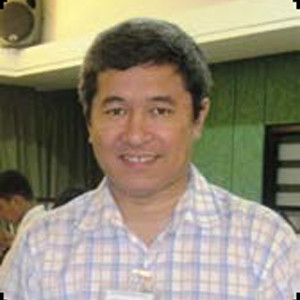
Maraming Salamat Jimmy
Dr Jimmy Galvez Tan has been a major influence in my decision to take on a vocation in the field …
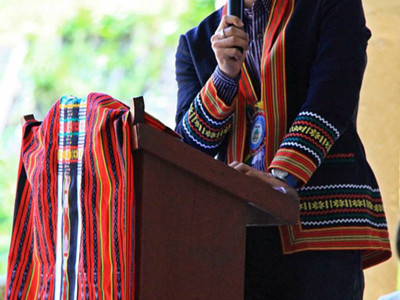
Ryan Guinaran, MD
Dr. Galvez Tan is a mentor and model of generations of community-oriented physicians and health professionals who emulate, if not …
He is an innovator and authority in public health, administration, policy, community health, public service, social responsibility and integrative medicine.
Ryan Guinaran, MD
Doc Jimmy was one of the few who exposed us to the vast responsibilities of a healthcare provider which transcends the four walls of a clinic.
Allison Gocotano, MD
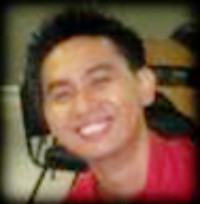
Allison Gocotano, MD
I first met Dr. Jaime Z. Galvez Tan (Doc Jimmy) as one of my professors at the University of the …
He has defined what heroic service really is - love for the country, selfless desire to deny the prestige and privilege of the profession and to delve and live the true value of being what a doctor is the passion and compassion for the poor
Heidee Exconde, MD
If the TOFP award was created according to some model Filipino physician’s mold, then it was Dr. Jaime Galvez Tan’s.
Dr. Paolo Victor N. Medina
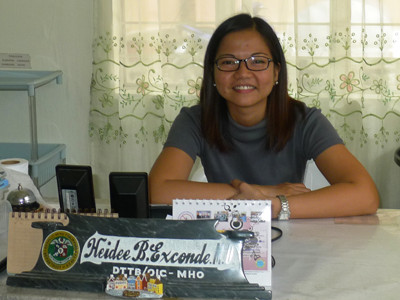
Heidee Exconde, MD
Dr. Galvez-Tan has taught me to have a heart for the poor, that we are servants of our profession and …
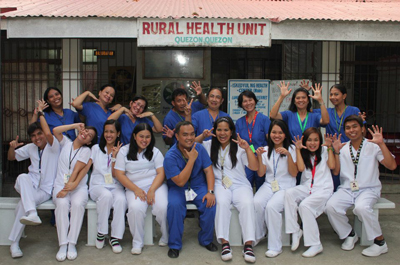
Dr. Paolo Victor N. Medina
When I was told of Dr. Jaime Galvez Tan’s nomination to the Ten Outstanding Filipino Physicians (TOFP) for 2012 my …
Research Papers
“Source” Country Perspective on the Migration of Highly Trained Health Personnel: Key Informant Interviews in South Africa, Jamaica, India and …
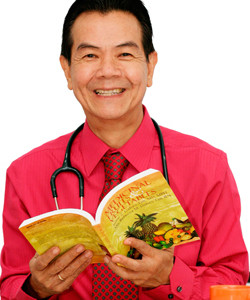
Publications
Co-Author, Manual for Leader-Teacher-Health Workers in the Waray language, 1978. Co-Author, Fruits and Vegetables with Medicinal Properties, 1981. Revised 1988. …
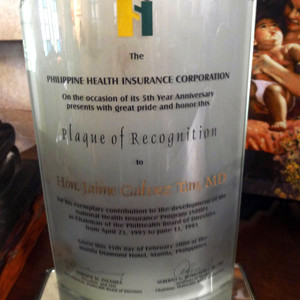
Other Awards
Antonio Sison Memorial Lecturer 2005 Lauro Panganiban Memorial Lecturer 2005 6th Lourdes Manahan Presidential Lecturer, 2001 Gawad sa Serbisyong Pangkomunidad …
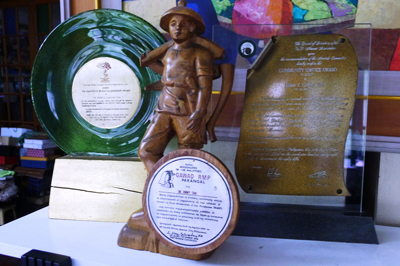
Gawad Rural Missionary of the Philippines
Gawad Rural Missionary of the Philippines, given by the Rural Missionaries of the Philippines (RMP) during their 25th Anniversary, Quezon …
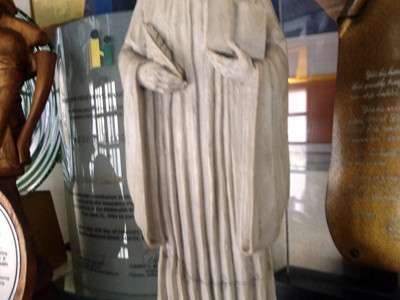
One of the 100 Outstanding Bedans of the Century (1901-2001)
San Beda College
Get the latest Ebook of Doc Jimmy
Health in the Hands of the People: Framework and Action is a collection of Dr. Jaime Galvez Tan’s essays, reflecting over three decades of his work in the field of medicine and public health. Drawing from his experience from as far back as 1970s in the doctorless island of Maripipi in Biliran, the book tackles a wide range of issues that plague the Philippine Health System to this very day. It touches on the predominance of Western approach to diagnosis and treatment, economic, political and cultural factors that shape service delivery, the myriad of health system reforms implemented to diminish health disparities, among many others. It is a visionary piece that looks forward to the day when development of national and local policies, programs and services are more participative and responsive to the needs of the people, a time when grassroots leadership in health is the norm rather than the exception.
Download EbookWE’D LOVE TO HEAR FROM YOU
Or… send us a message
Fill in the form below to send us a message. We will get back to you regarding your inquiry as soon as we can.
Thank you!
Find us on our Facebook page
